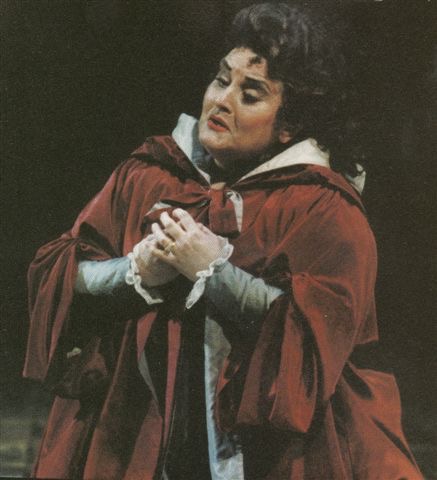
As Amelia in Un ballo in maschera
The least-known artist in this family of colleagues has one of the greatest voices. Ealynn Voss—that’s the ultimate evolution of E. Lynn (I’ll never tell what the E stands for!) Winkelvoss—was an admired protégée of Birgit Nilsson, who was hooked the moment she heard Lynn sing “In questa reggia” in a master class. The myriad eventual destinations of the Voss Turandot (Baltimore, Charlotte, Copenhagen, Costa Mesa [Opera Pacific], Houston, Miami, New York [City Opera], Phoenix and Tucson [Arizona Opera], Pretoria, Rome, San Diego, San Francisco, Sydney, the Arena di Verona company on tour in Japan, and so forth) rivaled the great Swedish soprano’s own career itinerary with Puccini’s fire-and-ice princess. Los Angeles Opera effectively functioned as the Voss home company for a number of seasons. Though it never worked out for her to sing Turandot there, she was Ariadne, Chrysothemis, Senta, and the Ballo Amelia to considerable acclaim. That great music critic Martin Bernheimer once lamented her absence in print after hearing an inferior soprano: “Where was Ealynn Voss when we needed her?” EV and BB met when judging (along with old pal Marni Nixon) the Opera Guild of Southern California voice competition in 1992. We were instantly in synch—it was as if we had known each other all our lives. At the time, Ealynn’s husband and soulmate, L. A. Philharmonic violinist Amadeo Altene (a dear and beautiful man) was already suffering from the leukemia that would take him from her prematurely.
She was the ultimate professional and didn’t cancel a single appearance when Amadeo died (during a run of Ariadne auf Naxos), though it was sheer hell to get through those performances in which the heroine must first bewail the loss of true love and then wax ecstatic over discovering it anew with another man. Later, a harrowing bout with a virulent form of breast cancer effectively ended Lynn’s career. Impatient impresarios and agents weren’t interested in the reasons for her necessary defection from contracts—the one from which she had to withdraw on a day’s notice upon diagnosis was for Turandot at the Met, with rehearsals under way—and year-long inability to enter into new ones. Though she resumed singing when necessary strength was again available, final retirement came in less than two years. Neither of us could possibly know at the time our friendship began, though it had already happened to me then, that the saddest thing we would end up having in common is that both stopped singing because of illness. Now the doyenne of a lovely home in Elizabeth, Pennsylvania, which she shared with her extraordinarily spirited, appropriately named mother, Jewel, until the latter’s death in October 2009, Ealynn still exudes the aura of a diva—but also of a salt-of-the-earth, feet-on-the-ground human being, the rarest of combinations. She has always had more in common with the great Birgit than mere voice type alone. (May, 2010)
